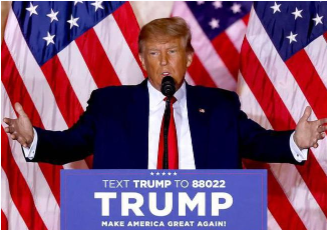Industry News
Home>News > Industry NewsWhat changes may China's foreign trade face after Trump takes office?
1、 What impact will Trump's election have on China's foreign trade??
During Trump's first term, US China relations experienced several turbulence due to the trade war. Trump is known for his aggressive tariff policies, suppression of Chinese technology companies, and multiple attempts to constrain China's technological development through sanctions. During the Trump administration's 2017-2021 term, the Trump administration imposed high tariffs on Chinese imports worth hundreds of billions of dollars, with the intention of reducing the trade deficit and forcing China to undertake structural economic reforms. With Trump's victory this time, similar or even tougher policies may make a comeback.? These can be seen in Trump's campaign statements, where he has repeatedly stated that if he is re elected president, he will adopt more aggressive trade policies and impose high tariffs on goods from countries such as China. According to data, in 2019, China's export growth rate denominated in US dollars slowed down significantly, only rising by 0.5%, in sharp contrast to the growth rates of 7.9% and 9.9% in 2017 and 2018. As China's largest export destination, the decline in exports from the United States directly dragged down China's overall export data. In 2019, China's total exports to the United States decreased by 12.5% year-on-year.? Now that Trump is re elected, he may continue to implement or even escalate these trade protection measures. According to analysis by well-known foreign industry organizations, Trump may impose additional tariffs of up to 60% on Chinese textile and clothing products. China supplies about 33% of US clothing imports and dominates the textile manufacturing industry. High tariffs will lead to price increases, rapid changes in procurement, and have a chain effect on the US, UK, and EU clothing markets.? For example, American consumers will face a significant increase in clothing prices. Due to the important market share of Chinese textiles and clothing products in the United States, a high tariff of 60% will force American importers to raise prices, thereby transferring costs to consumers, resulting in a 10-25% increase in retail prices for denim, sportswear, and basic synthetic products that heavily rely on Chinese imports.
2、 How should Chinese foreign trade enterprises respond??
Trump's return to the White House will lead the global trade and economic landscape into a more uncertain and tumultuous period. From the bold implementation of tariff policies, to the renewed efforts of corporate tax reductions and exemptions, as well as measures to decouple from China and strictly control exports, all of these indicate that a new era of the global economy is about to come.? So, how should Chinese foreign trade enterprises respond?? Accelerate the adjustment of export regional layout, improve the comprehensive competitiveness of exports, and reduce dependence on the US market; At the same time, Chinese enterprises need to improve the quality and technological content of their exported products, enhance their international competitiveness, and cope with trade shocks. This needs to be addressed from the following aspects:? 1. Strengthen the exploration of emerging markets and reduce dependence on a single market? In terms of adjusting the layout of export regions, the government and enterprises should strengthen their exploration of emerging markets and developing country markets. By actively participating in and promoting the implementation and deepening of multilateral and regional trade agreements such as the Regional Comprehensive Economic Partnership (RCEP), we will strengthen economic cooperation with major trade partners such as the the Belt and Road, BRICS, the EU, and ASEAN. For example, utilizing the preferential policies of RCEP to expand exports to ASEAN countries; Engage in trade negotiations with the European Union to strive for more favorable trade conditions. At the same time, by establishing production bases and sales networks in emerging markets through investment cooperation and other means, broader trade relationships can be established.

